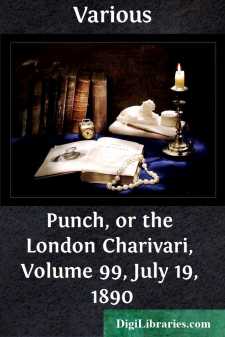Categories
- Antiques & Collectibles 13
- Architecture 36
- Art 48
- Bibles 22
- Biography & Autobiography 813
- Body, Mind & Spirit 142
- Business & Economics 28
- Children's Books 15
- Children's Fiction 12
- Computers 4
- Cooking 94
- Crafts & Hobbies 4
- Drama 346
- Education 46
- Family & Relationships 57
- Fiction 11829
- Games 19
- Gardening 17
- Health & Fitness 34
- History 1377
- House & Home 1
- Humor 147
- Juvenile Fiction 1873
- Juvenile Nonfiction 202
- Language Arts & Disciplines 88
- Law 16
- Literary Collections 686
- Literary Criticism 179
- Mathematics 13
- Medical 41
- Music 40
- Nature 179
- Non-Classifiable 1768
- Performing Arts 7
- Periodicals 1453
- Philosophy 64
- Photography 2
- Poetry 896
- Political Science 203
- Psychology 42
- Reference 154
- Religion 513
- Science 126
- Self-Help 84
- Social Science 81
- Sports & Recreation 34
- Study Aids 3
- Technology & Engineering 59
- Transportation 23
- Travel 463
- True Crime 29
Punch, or the London Charivari, Volume 99, July 19, 1890
by: Various
Categories:
Description:
Excerpt
OUR BOOKING-OFFICE.
PARALLEL.
Joe, the Fat Boy in Pickwick, startles the Old Lady; Oscar, the Fad Boy in Lippincott's, startles Mrs. Grundy.Oscar, the Fad Boy. "I want to make your flesh creep!"
The Baron has read OSCAR WILDE'S Wildest and Oscarest work, called Dorian Gray, a weird sensational romance, complete in one number of Lippincott's Magazine. The Baron, recommends anybody who revels in diablerie, to begin it about half-past ten, and to finish it at one sitting up; but those who do not so revel he advises either not to read it at all, or to choose the daytime, and take it in homoeopathic doses. The portrait represents the soul of the beautiful Ganymede-like Dorian Gray, whose youth and beauty last to the end, while his soul, like JOHN BROWN'S, "goes marching on" into the Wilderness of Sin. It becomes at last a devilled soul. And then Dorian sticks a knife into it, as any ordinary mortal might do, and a fork also, and next morning
"Lifeless but 'hideous' he lay,"
while the portrait has recovered the perfect beauty which it possessed when it first left the artist's easel. If OSCAR intended an allegory, the finish is dreadfully wrong. Does he mean that, by sacrificing his earthly life, Dorian Gray atones for his infernal sins, and so purifies his soul by suicide? "Heavens! I am no preacher," says the Baron, "and perhaps OSCAR didn't mean anything at all, except to give us a sensation, to show how like BULWER LYTTON'S old-world style he could make his descriptions and his dialogue, and what an easy thing it is to frighten the respectable Mrs. Grundy with a Bogie." The style is decidedly Lyttonerary. His aphorisms are Wilde, yet forced. Mr. OSCAR WILDE says of his story, "it is poisonous if you like, but you cannot deny that it is also perfect, and perfection is what we artists aim at." Perhaps; but "we artists" do not always hit what we aim at, and, despite his confident claim to unerring artistic marksmanship, one must hazard the opinion, that in this case Mr. WILDE has "shot wide." There is indeed more of "poison" than of "perfection" in Dorian Gray. The central idea is an excellent, if not exactly novel, one; and a finer art, say that of NATHANIEL HAWTHORNE, would have made a striking and satisfying story of it. Dorian Gray is striking enough, in a sense, but it is not "satisfying" artistically, any more than it is so ethically. Mr. WILDE has preferred the sensuous and hyperdecorative manner of "Mademoiselle DE MAUPIN," and without GAUTIER'S power, has spoilt a promising conception by clumsy unideal treatment. His "decoration" (upon which he plumes himself) is indeed "laid on with a trowel." The luxuriously elaborate details of his "artistic hedonism" are too suggestive of South Kensington Museum and æsthetic Encyclopædias. A truer art would have avoided both the glittering conceits, which bedeck the body of the story, and the unsavoury suggestiveness which lurks in its spirit. Poisonous! Yes. But the loathly "leperous distilment" taints and spoils, without in any way subserving "perfection," artistic or otherwise....












